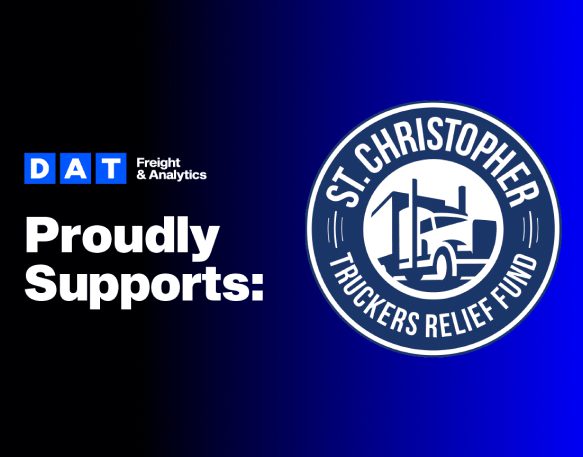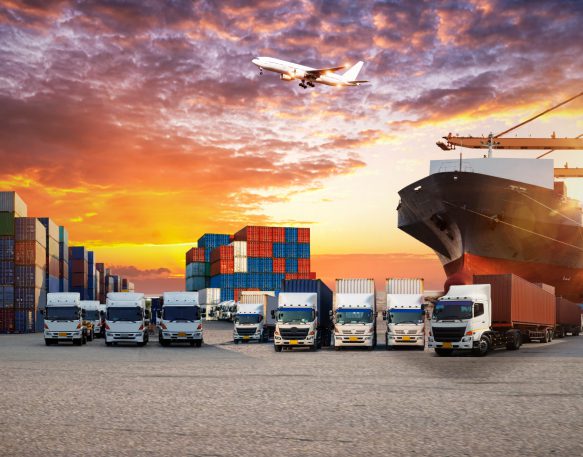
The 2023 JOC Inland Distribution Conference took place in Chicago from Sept. 26-28. DAT Freight & Analytics Principal Analyst Dean Croke was among the featured speakers over the annual three-day event, serving as a panelist during the Trucking’s Route to a Rebound keynote session.
Croke was joined on the panel by industry experts Chris Jamroz (RoadRunner), Lee Klaskow (Bloomberg), Lisa Obecny (Winland Foods), and William B. Cassidy (S&P Global). The group discussed how a freight demand rebound in 2024 could impact capacity levels, rates, carrier mixes, spending, and more. While the time and extent of the market turn is still unclear, it will undoubtedly force shippers and carriers to adjust their operations and align with another new normal.
Below are three additional takeaways from JOC Inland23:
Intermodal shippers will maintain leverage in early 2024 bids
Analysts project domestic intermodal shippers to continue seeing favorable contract rates throughout the first quarter of 2024. With container supply still outpacing demand, rates are expected to be flat YoY, giving shippers leverage over intermodal providers in negotiations and procurement.
“All of us will fight our darndest to make sure we stay flat,” Paul Svindland, CEO of STG Logistics, told the conference. “To be honest, I’m not sure we’ll be able to. If the contracts are flat, that would be a win.”
Svindland said during the conference that intermodal carriers like his company will need to wait until late 2024 or early 2025 to pursue rate increases. Considering intermodal rates historically lag truckload rates, increased demand for long-haul trucking will likely indicate the start of higher intermodal pricing. If a market turn materializes during the middle of the year, carriers may not honor contractual truckload rates and seek to reopen their annual agreements. It will be important for shippers to integrate non-asset 3PL providers within their fleet to mitigate that risk.
U.S. trucking costs are rising amid weak demand
U.S. trucking and parcel leaders expect increased operating expenses to keep rates high through 2024. Despite reduced capacity levels, the rising costs of labor, fuel, real estate, and insurance are making transportation networks more expensive, leading to increased urgency for shippers and carriers to work together to optimize costs ahead of the market turn.
This heightens the importance for shippers to prioritize strong carrier relationships. Freight analytics enables both parties to base negotiations on neutral third-party data and real-time rate insights from the wider transportation market. Pivoting away from traditional negotiation tactics rooted in anecdotal reasoning helps foster a value-centric partnership built on trust and cost transparency.
The pandemic caused an increase in cargo crime
The rate of U.S. truckload thefts increased by 128% YoY in the second quarter of 2023, with the value of stolen goods surpassing more than $44 million. Shippers moving electronics and CPG products were impacted the most, especially in major cities like Chicago, Houston, and Los Angeles that serve as transportation network hubs.
“We’re just getting killed here, month by month,” CargoNet VP of Operations Keith Lewis told the conference. “We haven’t even gotten into the busy time of the year for the Christmas rush. That’s going to get crazy.”
Lewis pointed to COVID-19 as a key driver of the rising problem. The pandemic era highlighted the ease and convenience of executing truckload theft. Cybercriminals are able to digitally facilitate it from anywhere in the world. In addition, cargo can also be quickly unloaded and reloaded to another untraceable truck when insider threats are involved.
Energy drinks are a top target of cargo theft due to their lucrative international black market. In addition, solar panels have become increasingly targeted by criminals amid the rise of eco-conscious green energy alternatives. Nearly 20% of all Q2 U.S. truckload thefts were in California (164), followed by Texas (63) and Illinois (33).
For more information on how DAT iQ can help you keep pace with the evolving market, visit data.dat.com/Empower_iQ.


